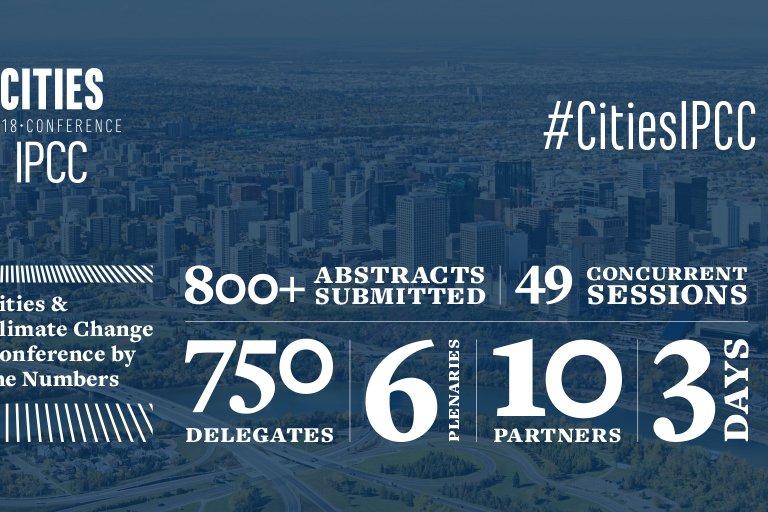CitiesIPCC conference advances science research agenda

The CitiesIPCC Cities and Climate Change Science Conference culminated with the establishment of a global blueprint to better understand climate change, its impacts on cities, and the critical role localities play in solving this challenge.
Over the course of three days, scientists, policymakers, researchers and development experts worked to assess the current state of academic and practice-based knowledge related to cities and climate change, identify key knowledge priorities, and chart a course forward for academic, practitioner and urban policy-making communities.
The conference agreed that transformation needs to happen now. Specifically, conference participants coalesced around the need for:

Inclusion and social transformation
Funding & finance
Improving evidence-based information
· Boundaries of urban systems
· Exploring trade-offs and synergies of climate change mitigation & adaptation
· Data, scenarios and modelling at the city level
· Robust climate and urban information
· Inequity in data gaps; mapping informal settlements
· Potential and benefits of Nature-Based Solutions
The conference, the first of its kind, was co-sponsored by the Intergovernmental Panel on Climate Change (IPCC), with nine partners - C40 Cities, Cities Alliance, Future Earth, ICLEI, the Sustainable Development Solutions Network (SDSN), United Cities and Local Governments (UCLG), the United Nations Environment Programme (UN Environment), UN-Habitat, and the World Climate Research Programme (WCRP).
“Years from now we will look back at this conference time in Edmonton and celebrate how the collaboration between the scientific community, policymakers and practitioners helped initiate positive change at the local level. I’m so proud that Edmonton was able to play host to some of the brightest minds on our globe and I’m committed to furthering the efforts that came out of this conference,” said Don Iveson, Mayor of Edmonton.
The CitiesIPCC conference helped forge stronger partnerships among the 750 leaders, innovators, and influencers who registered, and cultivated a collaborative environment among academics, policymakers and practitioners to share new findings, initiatives and programs. Over 6,000 others from more than 30 countries followed the conference online.
“Business-as-usual will not save the world. This conference disrupted the traditional story of the world’s cities to show how science can partner with policy and practice to transform the world’s cities into climate-smart, equitable and sustainable homes for all,” said Debra Roberts, Co-Chair of IPCC Working Group II, and a member of the conference’s Scientific Steering Committee.
“Cities represent the next frontier in climate science. There is a need for both long-term projections of climate change over decades and centuries to help us design resilient and sustainable cities of the future right now. And we also need very localized weather forecasts and climate predictions on timescales from hours to years to decades in order to optimally manage complex urban systems and protect life and property,” said Deon Terblanche, acting director of the World Climate Research Program (WCRP).
WCRP, which is co-sponsored by WMO is one of the partners of the conference.
WMO showcased two new initiatives at the event:
The Integrated Urban Weather, Environment and Climate Services seeks to provide science-based integrated urban services supporting safe, healthy and resilient cities. WMO is currently developing a guide to this new initiative and hosted a session at the CitiesIPCC conference to gather feedback and input.
The intent of the guide is to document the best available knowledge, technologies and practices for producing and providing the relevant services that cities require to respond to the hazards posed by climate change. Such services include a combination of dense observation networks, high-resolution forecasts, multi-hazard early warning systems, and climate services. These services should assist cities in setting and implementing mitigation and adaptation strategies to build resilient and thriving cities that promote the Sustainable Development Goals (SDGs).
The guide also plans to include a multidisciplinary approach to better serve the social-economic needs of urban areas, and identify the required partnerships to establish and sustain urban services, including research, city governments, international organizations, and private sector stakeholders.
Integrated Greenhouse Gas Information System
WMO has initiated the development of an Integrated Global Greenhouse Gas Information System to help guide greenhouse gas emission reduction actions. The aim is to build confidence in the role of atmospheric composition measurements as an essential part of climate change mitigation efforts.

WMO representatives addressed sessions at the CitiesIPCC conference on mapping the greenhouse gas data landscape. As interest in the emissions profile of cities has grown, so has the range of stakeholders and use-cases for the data included in a community-scale greenhouse gas inventory. In many cases inventories are built around “best available” activity data rather than data tailored for a particular purpose. As multi-year data from cities emerges, limitations of certain data for understanding progress and performance management are coming into sharper focus. Meanwhile novel approaches for direct measurement of gases emanating from cities are maturing and offer insight into these challenges.
A series of research papers from the CitiesIPCC Scientific Steering Committee and published in Nature and Nature Climate Change was presented at the conference, including five commissioned research papers and a separate batch of four research papers published in Nature and Nature Climate Change. These papers frame some key issues being discussed at the conference this week.
CitiesIPCC conference website is here










